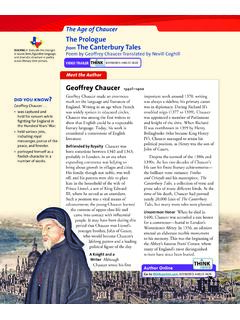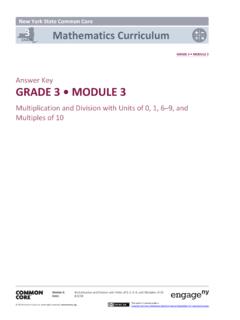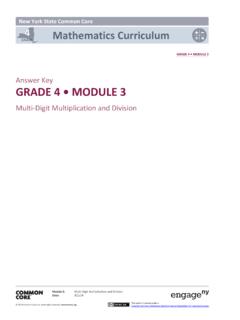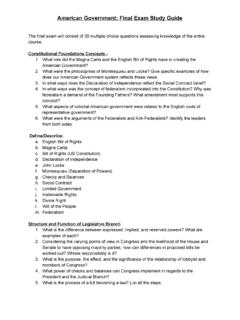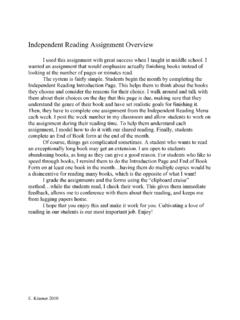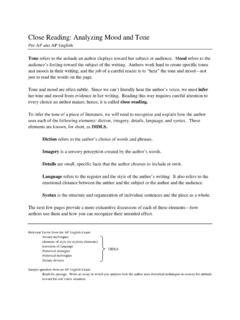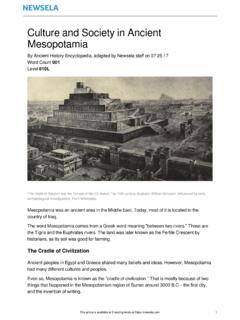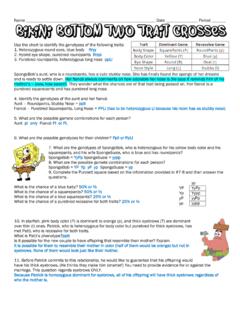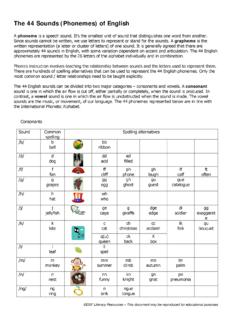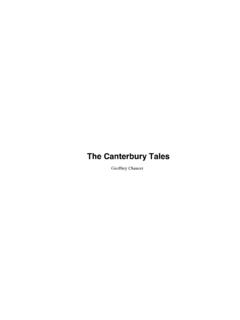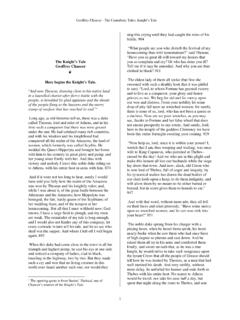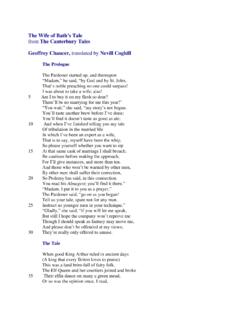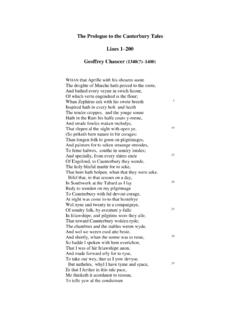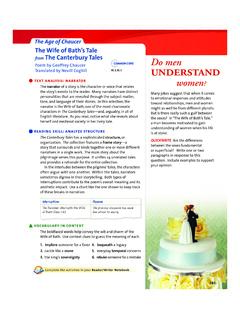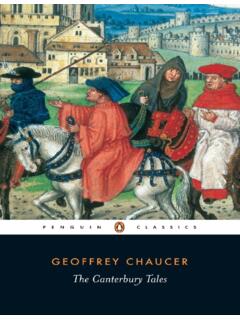Transcription of The Prologue from The Canterbury Tales READING 3 in …
1 The Age of ChaucerThe Prologue from The Canterbury TalesPoem by Geoffrey chaucer Translated by Nevill Coghilldid you know? Geoffrey chaucer .. was captured and held for ransom while fighting for England in the Hundred Years War. held various jobs, including royal messenger, justice of the peace, and forester. portrayed himself as a foolish character in a number of the AuthorGeoffrey chaucer made an enormous mark on the language and literature of England. Writing in an age when French was widely spoken in educated circles, chaucer was among the first writers to show that English could be a respectable literary language. Today, his work is considered a cornerstone of English by Royalty chaucer was born sometime between 1340 and 1343, probably in London, in an era when expanding commerce was helping to bring about growth in villages and cities. His family, though not noble, was well off, and his parents were able to place him in the household of the wife of Prince Lionel, a son of King Edward III, where he served as an attendant.
2 Such a position was a vital means of advancement; the young chaucer learned the customs of upper-class life and came into contact with influential people. It may have been during this period that chaucer met Lionel s younger brother, John of Gaunt, who would become chaucer s lifelong patron and a leading political figure of the day. A Knight and a Writer Although chaucer wrote his first important work around 1370, writing was always a sideline; his primary career was in diplomacy. During Richard II s troubled reign (1377 to 1399), chaucer was appointed a member of Parliament and knight of the shire. When Richard II was overthrown in 1399 by Henry Bolingbroke (who became King Henry IV), chaucer managed to retain his political position, as Henry was the son of John of Gaunt. Despite the turmoil of the 1380s and 1390s, the last two decades of chaucer s life saw his finest literary achievements the brilliant verse romance Troilus and Criseyde and his masterpiece, The Canterbury Tales , a collection of verse and prose Tales of many different kinds.
3 At the time of his death, chaucer had penned nearly 20,000 lines of The Canterbury Tales , but many more Tales were planned. Uncommon Honor When he died in 1400, chaucer was accorded a rare honor for a commoner burial in London s Westminster Abbey. In 1556, an admirer erected an elaborate marble monument to his memory. This was the beginning of the Abbey s famous Poets Corner, where many of England s most distinguished writers have since been chaucer 1340? 1400 KEYWORD: HML12-142 AVIDEO TRAILERGo to KEYWORD: HML12-142 BAuthor Onlineadvancement; thethe customs ocame into copeople. It mperiod thatyounger bwho wlifepoA KWCREADING 3 Evaluate the changes in sound, form, figurative language, and dramatic structure in poetry across literary time 1429/9/09 1:50:46 PM9/9/09 1:50:46 PMWhat makes a great character?Creating a great character requires a sharp eye for detail, a keen understanding of people, and a brilliant imagination all of which chaucer possessed.
4 chaucer populated The Canterbury Tales with a colorful cast of characters whose virtues and flaws ring true even today, hundreds of years later. QUICKWRITE Work with a partner to invent a character. Start with an intriguing name. Then come up with questions that will reveal basic information about the character, such as his or her age, physical appearance, family and friends, job, home, and personal tastes. Brainstorm possible answers for the questions. Then circle the responses that have the best potential for making a lively character. literary analysis: characterizationCharacterization refers to the techniques a writer uses to develop characters. In The Prologue , the introduction to The Canterbury Tales , chaucer offers a vivid portrait of English society during the Middle Ages. Among his 30 characters are clergy, aristocrats, and commoners. chaucer employs a dramatic structure similar to Boccaccio s The Decameron each pilgrim tells a tale.
5 Some of the ways chaucer characterizes the pilgrims include description of a character s appearance examples of a character s speech, thoughts, and actions the responses of others to a character the narrator s direct comments about a characterAs you read, look for details that reveal the character traits, or consistent qualities, of each pilgrim. READING strategy: paraphraseReading medieval texts, such as The Canterbury Tales , can be challenging because they often contain unfamiliar words and complex sentences. One way that you can make sense of chaucer s work is to paraphrase, or restate information in your own words. A paraphrase is usually the same length as the original text but contains simpler language. As you read, paraphrase difficult passages. Here is an s WordsParaphrase When in April the sweet showers fal l/And pierce the drought of March to the root, .. (lines 1 2)When the April rains come and end the dryness of March.
6 Vocabulary in contextThe following boldfaced words are critical to understanding chaucer s literary masterpiece. Try to figure out the meaning of each word from its context. 1. The refined gentleman always behaved with courtliness. 2. She remained calm and sedately finished her meal. 3. The popular politician was charming and personable. 4. When you save money in a bank, interest will accrue. 5. Does she suffer from heart disease or another malady? 6. She made an entreaty to the king, asking for a the activities in your Reader/Writer : Bartholomew Throckmorton 1. What is his occupation? duke squire to a knight sea captain town doctor grave digger 2. Where does he live? 3. 4. 5. the Canterbury Tales 1439/9/09 1:51:32 PM9/9/09 1:51:32 PM144 unit 1: the anglo-saxon and medieval periods When in April the sweet showers fallAnd pierce the drought of March to the root, and allThe veins are bathed in liquor of such powerAs brings about the engendering of the flower,When also Zephyrus with his sweet breathExhales an air in every grove and heathUpon the tender shoots, and the young sunHis half-course in the sign of the Ram has run,And the small fowl are making melodyThat sleep away the night with open eye(So nature pricks them and their heart engages)Then people long to go on pilgrimagesAnd palmers long to seek the stranger strandsOf far-off saints, hallowed in sundry lands,And specially, from every shire s endOf England, down to Canterbury they wendTo seek the holy blissful martyr, quickTo give his help to them when they were sick.
7 AIt happened in that season that one dayIn Southwark, at The Tabard, as I lay5101520background In The Prologue of The Canterbury Tales , a group gathers at the Tabard Inn in Southwark, a town just south of London, to make a pilgrimage to the shrine of Saint Thomas Becket at Canterbury . At the suggestion of the innkeeper, the group decides to hold a storytelling competition to pass the time as they travel. The Prologue introduces the sundry folk who will tell the stories and is followed by the Tales themselves 24 in all. he Canterbury talesGeoffrey chaucer The Prologue 5 Zephyrus (zDfPEr-Es): the Greek god of the west wind. 8 the Ram: Aries the first sign of the zodiac. The time is palmers: people journeying to religious shrines; pilgrims; strands: shores. 14 sundry (sOnPdrC): shire s: county martyr: St. Thomas PARAPHRASER estate lines 1 18. Why does the group make its pilgrimage in April? Illustrations by Teresa 1449/9/09 1:54:50 PM9/9/09 1:54:50 PM146 unit 1: the anglo-saxon and medieval periods Ready to go on pilgrimage and startFor Canterbury , most devout at heart,At night there came into that hostelrySome nine and twenty in a companyOf sundry folk happening then to fallIn fellowship, and they were pilgrims allThat towards Canterbury meant to rooms and stables of the inn were wide;They made us easy, all was of the , briefly, when the sun had gone to rest,I d spoken to them all upon the tripAnd was soon one with them in fellowship,Pledged to rise early and to take the wayTo Canterbury , as you heard me none the less, while I have time and space,Before my story takes a further pace,It seems a reasonable thing to sayWhat their condition was, the full arrayOf each of them, as it appeared to me,According to profession and degree,And what apparel they were riding in.
8 And at a Knight I therefore will begin. bThere was a Knight, a most distinguished man,Who from the day on which he first beganTo ride abroad had followed chivalry,Truth, honor, generousness and had done nobly in his sovereign s warAnd ridden into battle, no man more,As well in Christian as in heathen places,And ever honored for his noble we took Alexandria, he was often sat at table in the chairOf honor, above all nations, when in Lithuania he had ridden, and Russia,No Christian man so often, of his , in Granada, Algeciras sankUnder assault, he had been there, and inNorth Africa, raiding Benamarin;In Anatolia he had been as wellAnd fought when Ayas and Attalia fell,For all along the Mediterranean coastHe had embarked with many a noble fifteen mortal battles he had beenAnd jousted for our faith at Tramissene253035404550556045 chivalry (shGvPEl-rC): the code of behavior of medieval knights, which stressed the values listed in line Alexandria: a city in Egypt, captured by European Christians in 1365.
9 All the places named in lines 51 64 were scenes of conflicts in which medieval Christians battled Muslims and other non-Christian jousted: fought with a lance in an arranged battle against another PARAPHRASEP araphrase lines 35 42. What does the narrator set out to accomplish in The Prologue ?23 hostelry (hJsPtEl-rC): CoachRoots and Affixes The suffix -ship can mean someone entitled to a specific rank of (lordship), art or skill of (craftsmanship), or state of (friendship). Which meaning applies to fellowship? Give another example of each use of -ship. the Canterbury Tales 147 Thrice in the lists, and always killed his same distinguished knight had led the vanOnce with the Bey of Balat, doing workFor him against another heathen Turk;He was of sovereign value in all though so much distinguished, he was wiseAnd in his bearing modest as a never yet a boorish thing had saidIn all his life to any, come what might;He was a true, a perfect gentle-knight.
10 CSpeaking of his equipment, he possessedFine horses, but he was not gaily wore a fustian tunic stained and darkWith smudges where his armor had left mark;Just home from service, he had joined our ranksTo do his pilgrimage and render had his son with him, a fine young Squire,A lover and cadet, a lad of fireWith locks as curly as if they had been was some twenty years of age, I stature he was of a moderate length,With wonderful agility and d seen some service with the cavalryIn Flanders and Artois and PicardyAnd had done valiantly in little spaceOf time, in hope to win his lady s was embroidered like a meadow brightAnd full of freshest flowers, red and he was, or fluting all the day;He was as fresh as is the month of was his gown, the sleeves were long and wide;He knew the way to sit a horse and could make songs and poems and recite,Knew how to joust and dance, to draw and loved so hotly that till dawn grew paleHe slept as little as a he was, lowly and serviceable,And carved to serve his father at the was a Yeoman with him at his side,No other servant; so he chose to Yeoman wore a coat and hood of green,And peacock-feathered arrows, bright and keenAnd neatly sheathed, hung at his belt the while6570758085909510010577 fustian (fOsPchEn): a strong cloth made of linen and Squire: a young man attending on and receiving training from a cadet: soldier in Flanders and Artois ( r-tw P) and Picardy (pGkPEr-dC): areas in what is now Belgium and northern fluting: Yeoman (yIPmEn): an attendant in a noble household; him: the thrice: three times; lists: fenced areas for van: vanguard the troops foremost in an attack.
